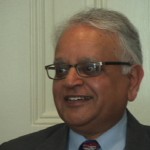Mukund Kulkarni
Dr. Mukund Kulkarni
Profile by Ashley K. Peel
Video Recording by Susan Rose
Interview conducted on 4/16/09, Carlisle, PA
Mukund Kulkarni left his hometown Maharashtra, India to pursue his education in the United States. Mukund came to the United States in July 1976 at the age of 28. He took a transnational flight to JFK airport in New York City to begin his new life with five dollars in his pocket, a love for reading, and an educational dream.
While in India, Mukund received his Master’s in economics and worked in the research department of a bank for four years. Mukund states that this job was “financially a very cushy job,” and that he was very satisfied with his lifestyle in India with his family and friends. However, Mukund says that his “desire to get a Ph.D.” propelled him to come to the United States:
[flv]http://mosaics.dickinson.edu/southasian2009/wp-content/uploads/sites/13/2009/04/mukund3.flv[/flv]
“So, I was afraid to give my job up and go back as a poor graduate student, and I could have gotten my PhD there. That was not a problem; very good schools in India. So, I thought I needed to go to a country where no one would know me and [the] United States became the one. So I resigned my job and came here. I did my MBA and then I did my Ph.D.”
Mukund worked very hard at his studies in order to achieve his Ph.D. His area of study was mathematics and economics. He realized “finance was the natural thing [to] do…” Mukund received his MBA, and later he was offered many job interviews from colleges and universities. Mukund says,
[flv]http://mosaics.dickinson.edu/southasian2009/wp-content/uploads/sites/13/2009/04/mukund1.flv[/flv]
“And so I did my Ph.D. I had tremendous number of interview calls, and calls for visiting the campus for interviews. My Ph.D. was not done yet. So, the first school I went to that made me an offer was the one I took. I didn’t worry about how the school was or whatever, because I had a wife and I had a child at that time, [and] my wife was not allowed to work.”
With a wife and two daughters to support and a new job, Mukund completed his dissertation for his Ph.D., achieving one aspect of his dream.
In his first academic position, Mukund received excellent teaching evaluations and praise for his research. Soon, he faced an important career decision, whether to continue teaching or take a job offer from the federal home loan bank board in Washington D.C. He expresses this transformative experience and how he made his ultimate decision:
[flv]http://mosaics.dickinson.edu/southasian2009/wp-content/uploads/sites/13/2009/04/mukund21.flv[/flv]
“So the coordinator for the course called me one day and said, ‘You know Mukund I know you have a very good offer from federal home loan bank board, but if you were to ask me, and you’re not asking me, I would strongly suggest you chose teaching as a profession.”
Mukund chose teaching, and since that point, Mukund has had a successful academic career. He received an appointment as a professor of finance at Penn State, Harrisburg in 1985. Currently, he is Senior Associate Provost for Academic Affairs.
For many years, Mukund was very involved in the Hindu community of Central Pennsylvania, but at present he dedicates more time to political issues. Mukund expresses his views on religion by saying, “I am a religious person, but not a person of religion. So to me that is not necessarily a good thing or a bad thing, people are good and they could be good for any religion…To me, religion is boring…Let’s talk what Obama’s policy is, or what’s happening in Afghanistan. To me, that is more interesting.” Mukund noted that although he has been very involved in the H.A.R.I. temple throughout the years, he no longer goes regularly. Mukund believes in accepting individuals for who they are, regardless of religion. He has a diverse group of friends, who are not all Hindus or Indians.
Mukund has been active in the Central Pennsylvania Indian community through Asian Indian Americans of Central Pennsylvania (AIACP), an organization that deals with local, national and international political issues which specifically affect the Indian community. Mukund is one of the four founders of AIACP in 1991. AIACP developed after the Indian community gathered together to fight a bill in the US Congress to sell F16 fighter jets to Pakistan. Mukund explained the community’s stance on this issue, “Indians around the country felt that this was the wrong thing to do…[so] in order to make that point known to the US Congress, we hired two buses here and some of us went to Washington, D.C. and we went to see our local congressman.” This mobilization caused the community to recognize that it had the ability to respond to issues that affected them, and several community members establish AIACP to help the community organize for the future.
Coming to America was a transformative experience for Mukund. He accomplished his dream for his education and career, and became truly immersed in the politics of America. In doing this, Mukund changed his own life and impacted his community. He has also helped a lot of students who, like himself, have immigrated from India or elsewhere with their own dream of education. As he has accomplished so much in America, Mukund explains that now America is home: “[I] went to India over the Christmas break. After the plane landed in Philadelphia…I felt like, ‘Oh I am home.’”

